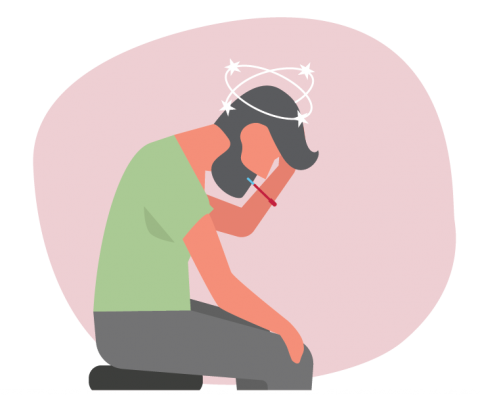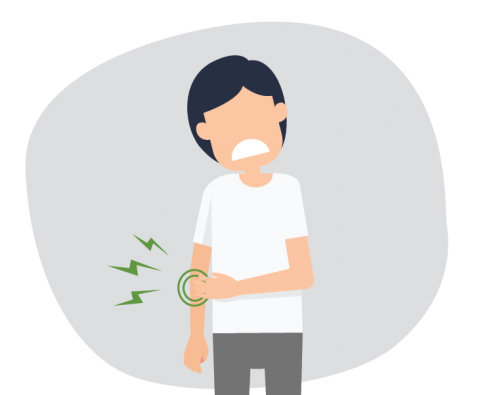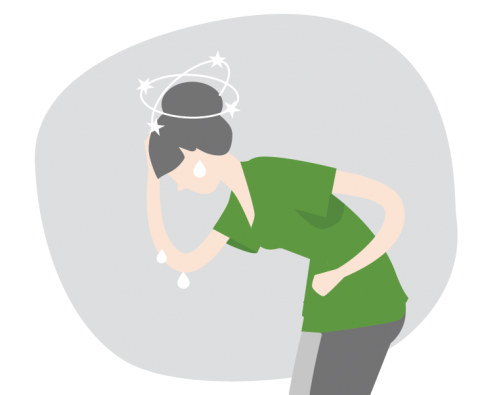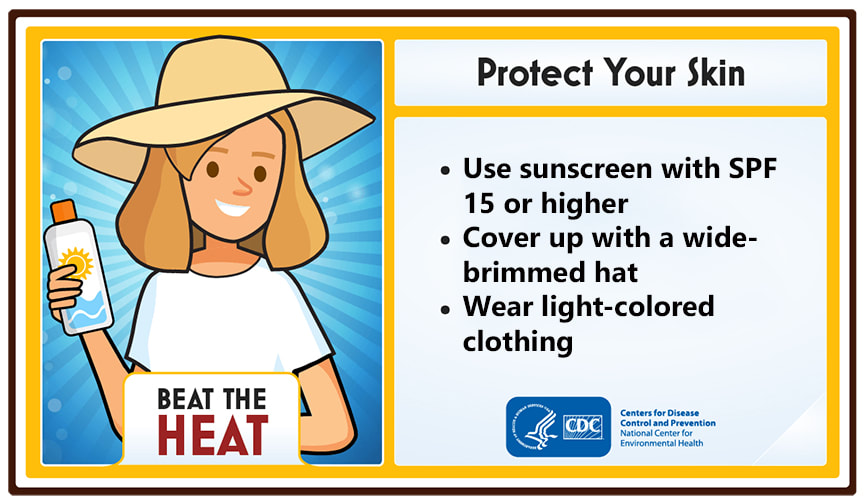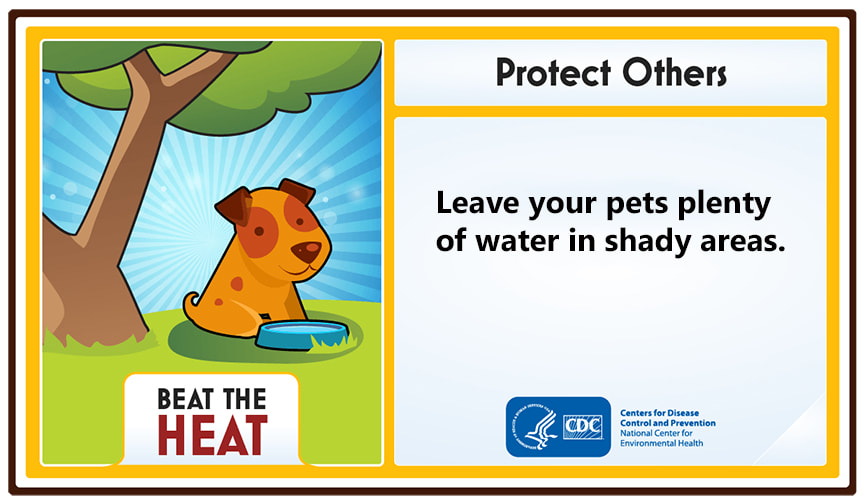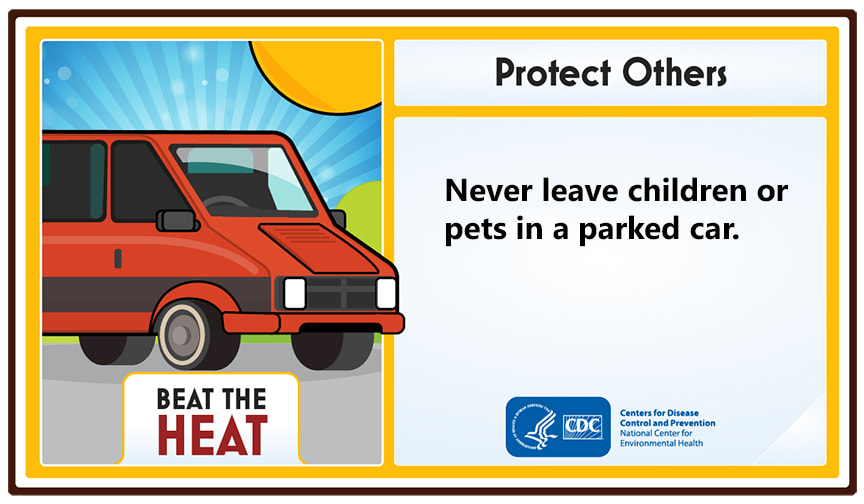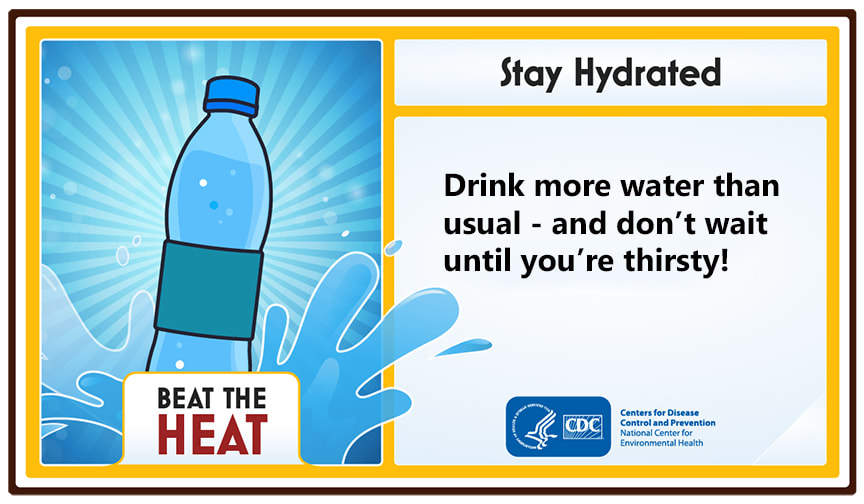|
HEAT STROKE
If you suspect heat stroke, call 9-1-1 or get the person to a hospital immediately. Cool down with whatever methods are available until medical help arrives. Do not give the person anything to drink. |
HEAT CRAMPS
|
HEAT EXHAUSTION
If you have signs of heat exhaustion, go to a cooler location and cool down by removing excess clothing and taking sips of sports drinks or water. Call your healthcare provider if symptoms get worse or last more than an hour. |
If you are experiencing a medical emergency call 9-1-1.
Get more detailed information about heat-related illnesses from the CDC and National Weather Service.
Extreme heat can occur quickly and without warning.
Older adults, children and sick or overweight individuals are at greater risk from extreme heat.
Humidity increases the feeling of heat as measured by a heat index.
— Find air conditioning.
— Avoid strenuous activities.
— Wear light clothing.
— Check on family members.
— Check on neighbors.
— Drink plenty of fluids.
— Never leave people or pets in vehicles.
— Do not rely on fans.
— Cover windows with drapes or shades.
— Weather-strip doors and windows.
— Use window reflectors.
— Add insulation to keep the heat out.
— Use a powered attic ventilator.
— Install window air conditioners.
Never leave a child, adult, or animal alone inside a vehicle on a warm day.
Find places with air conditioning. Libraries, shopping malls, and community centers can be a cool place to beat the heat.
Contact Low Income Home Energy Assistance Program (LIHEAP) for help.
Contact your local health department or locate an air-conditioned shelter in your area.
Spend some time at a shopping mall or public library- even a few hours spent in air conditioning can help.
Take cool showers or baths.
Don’t rely solely on fans to keep you cool. While electric fans might provide some comfort, when temperatures are really hot, they won’t prevent heat-related illness.
Use your stove and oven less to maintain a cooler temperature in your home.
If you’re outside, find shade. Wear a hat wide enough to protect your face. Wear appropriate cloth masks and keep a physical distance of at least six feet while you’re outside. Don’t wear a masks if you have trouble breathing or if you are unable to remove it on your own. Children under the age of 2 shouldn’t wear face coverings. If you can, wash your reusable mask regularly.
During extreme heat events, use a cloth mask that has breathable fabric, such as cotton, instead of polyester. Keep in mind that masks with filters, which are used when cleaning mold or debris, are often made with synthetic materials, which makes it harder to breathe.
Ensure that your mask covers your mouth and nose and is somewhat snug on your face, even when it is hot. Make sure that it is not too tight. You should not have trouble breathing while wearing the mask. If it is too tight, loosen it so that if fits snuggly without slipping. If it is too tight, loosen it so that if fits snugly without slipping.
Be sure to have several clean masks to use in case your mask becomes wet or damp from sweat during an extreme heat event. Cloth masks should not be worn when they become damp or wet. Be sure to wash your cloth masks regularly.
Wear loose, lightweight, light-colored clothing.
Drink plenty of fluids to stay hydrated. If you or someone you care for is on a special diet, ask a doctor what would be best.
Keep in mind that not everyone can afford to stock up on supplies, such as sports drinks, cleaning supplies, and non-perishable foods. If you can, slowly buy supplies in advance so that you don’t have to go to the store as often.
Being prepared allows you to avoid unnecessary excursions and to address minor medical issues at home, alleviating the burden on urgent care centers and hospitals.
Do not use electric fans when the temperature outside is more than 95 degrees. You could increase the risk of heat-related illness. Fans create air flow and a false sense of comfort, but do not reduce body temperature.
Avoid high-energy activities outdoors. Avoid working outdoors during the midday heat, if possible.
Check yourself, family members, and neighbors for signs of heat-related illness.


